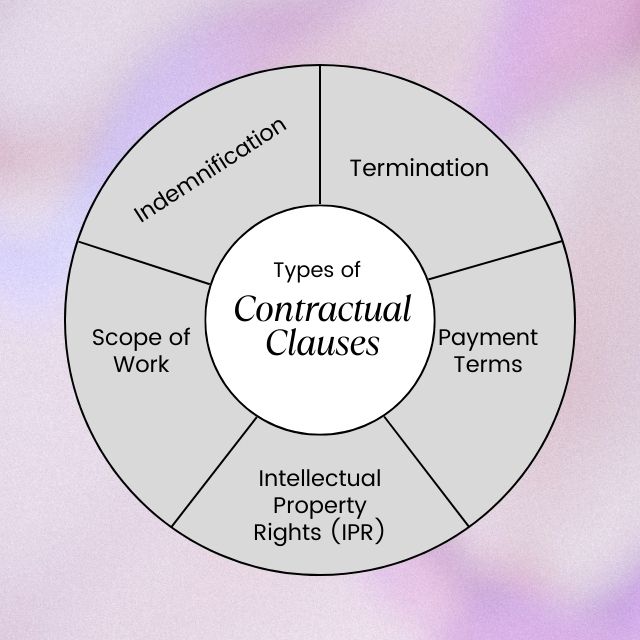Contracts serve as the backbone of business transactions, providing a framework for parties to define their rights, obligations, and responsibilities. Within these contracts, various clauses play crucial roles in shaping the agreement and delineating the parties’ intentions. Understanding the basics of contractual clauses is essential for navigating the complexities of contract negotiation, drafting, and enforcement.
In this comprehensive guide, we explore the key contractual clauses, their significance, and practical insights for effectively incorporating them into agreements. By gaining a deeper understanding of contractual clauses, businesses can enhance the clarity, enforceability, and effectiveness of their contracts, thereby fostering successful business relationships and mitigating risks associated with contractual disputes.
Overview of Contractual Clauses
Contractual clauses are integral components of contracts, delineating the rights, obligations, and responsibilities of the parties involved. These clauses serve to allocate risks, establish parameters for performance, and provide mechanisms for resolving disputes. Understanding the common types of contractual clauses is essential for effectively negotiating, drafting, and enforcing contracts.
Common Types of Contractual Clauses

- Scope of Work: This clause defines the tasks, deliverables, and responsibilities of each party involved in the contract. It establishes clear expectations regarding the project’s objectives and outlines the parameters within which each party must operate.
- Payment Terms: The payment terms clause outlines the agreed-upon payment schedule, methods, and conditions for invoicing and receiving payments. It helps prevent misunderstandings regarding financial obligations and ensures timely compensation for goods or services rendered.
- Termination: The termination clause specifies the conditions under which either party can terminate the contract, including notice periods, reasons for termination, and potential consequences. It provides clarity on exit strategies and protects parties in case of unforeseen circumstances.
- Intellectual Property Rights (IPR): The IPR clause delineates ownership rights, usage permissions, and confidentiality provisions related to intellectual property created or exchanged during the contract. It safeguards proprietary information and prevents disputes over ownership and usage rights.
- Indemnification: The indemnification clause outlines the responsibilities of each party in case of losses, damages, or liabilities arising from breaches of the contract or third-party claims. It allocates risks and liabilities and establishes procedures for resolving indemnification disputes.
Importance of Contractual Clauses
Contractual clauses serve as the building blocks of contracts, defining the rights, obligations, and responsibilities of the parties involved. Their importance cannot be overstated as they play a crucial role in clarifying the terms of the agreement, mitigating risks, and providing mechanisms for resolving disputes. Here’s a detailed exploration of the significance of contractual clauses:
Clarifying Rights and Obligations: Contractual clauses clearly outline the rights and obligations of each party, ensuring that both sides understand their roles and responsibilities under the agreement. This clarity helps prevent misunderstandings and disputes during the course of the contract.
Mitigating Risks: By incorporating specific clauses tailored to the needs and objectives of the parties, contracts can effectively mitigate various risks associated with the transaction. For example, indemnity clauses allocate financial responsibility for certain events, while limitation of liability clauses limit the extent of liability in case of breach or negligence.
Providing Mechanisms for Dispute Resolution: Disputes are inevitable in business transactions, but contractual clauses can provide mechanisms for resolving them efficiently. Arbitration clauses, for instance, specify that disputes will be resolved through arbitration rather than litigation, offering a faster and often more cost-effective means of resolution.
Practical Insights for Drafting Contractual Clauses
- Tailor Clauses to Specific Needs: Generic or boilerplate clauses may not adequately address the unique circumstances, objectives, and risk profiles of the parties involved. Therefore, it’s essential to tailor contractual clauses to the specific needs of the parties to ensure effective protection and alignment with their objectives.
- Seek Legal Advice: Drafting contractual clauses requires a deep understanding of applicable laws, industry standards, and best practices. Seeking legal advice from experienced professionals can help ensure that the clauses are legally sound, enforceable, and aligned with the parties’ objectives.
- Ensure Clarity and Precision: Clauses should be drafted in clear, concise, and unambiguous language to avoid misunderstandings and disputes. Ambiguity or vagueness in contractual language can lead to uncertainty and interpretation issues, potentially undermining the enforceability of the contract.
- Review and Revise Regularly: Contracts should be periodically reviewed and updated to ensure that the clauses remain relevant, accurate, and reflective of the parties’ current needs and circumstances. Changes in laws, regulations, or business practices may necessitate revisions to contractual clauses to ensure continued effectiveness and compliance.
In summary, contractual clauses play a pivotal role in shaping the rights, obligations, and responsibilities of parties in contracts. By incorporating tailored clauses and following best practices for drafting and reviewing contracts, parties can enhance the clarity, enforceability, and effectiveness of their agreements, thereby fostering successful business relationships and minimizing the risk of disputes.
Implications of Contractual Clauses
- Risk Allocation: Contractual clauses play a crucial role in allocating risks between parties by defining responsibilities and liabilities. Effective risk allocation mitigates uncertainties and ensures that each party bears a fair share of the risks associated with the contract.
- Enforceability and Compliance: Well-drafted clauses enhance the enforceability and compliance of the contract with relevant laws, regulations, and industry standards. They provide clarity on legal rights and obligations, minimizing the likelihood of disputes and legal challenges.
- Dispute Resolution: Clauses related to dispute resolution, such as arbitration or mediation, offer alternative mechanisms for resolving conflicts outside of traditional litigation. These clauses promote efficiency, confidentiality, and cost-effectiveness in resolving disputes, preserving business relationships in the process.
Best Practices for Drafting and Negotiating Clauses
- Clarity and Precision: Clauses should be drafted with clarity and precision to avoid ambiguity and misinterpretation. Clear language and defined terms enhance understanding and reduce the risk of disputes arising from vague provisions.
- Tailored Approach: Contractual clauses should be tailored to reflect the specific needs, objectives, and circumstances of the parties involved. A one-size-fits-all approach may overlook critical considerations and fail to address unique concerns.
- Legal Review: It is advisable to seek legal review and guidance when drafting or negotiating contractual clauses, particularly for complex agreements or high-value transactions. Legal professionals can provide insights, identify potential risks, and ensure compliance with relevant legal requirements.
In conclusion, contractual clauses are essential components of contracts that define the rights, obligations, and responsibilities of the parties. By understanding the basics of contractual clauses and incorporating them effectively into agreements, parties can enhance the clarity, enforceability, and effectiveness of their contracts. With careful drafting, tailored clauses, and proactive risk management, contracts become valuable tools for facilitating successful business relationships and achieving mutually beneficial outcomes.
Did you find this Legitt article worthwhile? More engaging blogs about smart contracts on the blockchain, contract management software and electronic signatures can be found in the Legitt Blogs section. You may also contact Legitt to hire the best contract lifecycle management services and solutions.
FAQs on Contractual Clauses
What are contractual clauses?
Contractual clauses are provisions within a contract that address specific aspects of the agreement, such as rights, obligations, and dispute resolution mechanisms.
Why are contractual clauses important?
They clarify the parties' rights and obligations, mitigate risks, and provide mechanisms for resolving disputes in contracts.
What is a force majeure clause?
A force majeure clause addresses unforeseen events or circumstances that may prevent parties from fulfilling their contractual obligations.
What does an indemnity clause do?
An indemnity clause obligates one party to compensate the other for losses, damages, or liabilities arising from specified events or breaches of the contract.
What is the purpose of a confidentiality clause?
A confidentiality clause, or non-disclosure agreement (NDA), protects sensitive information exchanged between parties during the course of their business relationship.
What does a termination clause specify?
A termination clause outlines the conditions under which either party may terminate the contract, including breaches of contract or changes in circumstances.
What is the role of jurisdiction and governing law clauses?
These clauses determine the jurisdiction in which disputes will be resolved and the governing law that will apply to the interpretation and enforcement of the contract.
How should contractual clauses be drafted?
Clauses should be tailored to the specific needs and objectives of the parties, drafted in clear, precise language, and periodically reviewed and updated.
Why is seeking legal advice important?
Legal advice ensures that clauses comply with applicable laws and industry standards, enhancing their enforceability and effectiveness in contracts.
What are some examples of force majeure events?
Natural disasters, wars, pandemics, and acts of terrorism are examples of force majeure events that may trigger the activation of a force majeure clause.
How does an indemnity clause allocate risks?
It obligates one party to compensate the other for losses, damages, or liabilities, thereby shifting the financial burden of specified events or breaches of contract.
Can termination clauses vary in complexity?
Yes, termination clauses can be simple or complex, depending on the nature of the contract and the parties' preferences regarding termination conditions and procedures.
What happens if a confidentiality clause is breached?
Breach of a confidentiality clause may result in legal consequences, such as monetary damages or injunctive relief, to prevent further disclosure of confidential information.
Are jurisdiction and governing law clauses always enforceable?
Jurisdiction and governing law clauses are generally enforceable, but their enforceability may be subject to certain legal considerations and public policy concerns in some jurisdictions.
How can parties ensure clarity in contractual clauses?
Parties should draft clauses in clear, concise, and unambiguous language to avoid misunderstandings and disputes over interpretation.
What are some examples of key terms in contractual clauses?
Key terms may include definitions of terms, obligations, responsibilities, rights, remedies, limitations of liability, and dispute resolution procedures.
Why is periodic review of contractual clauses important?
Periodic review ensures that clauses remain relevant, accurate, and reflective of the parties' current needs, circumstances, and changes in laws or regulations.
Can contractual clauses be negotiated?
Yes, parties can negotiate contractual clauses to tailor them to their specific needs, objectives, and preferences regarding risk allocation and dispute resolution.
What should parties consider when drafting termination clauses?
Parties should consider specifying termination conditions, notice periods, termination procedures, consequences of termination, and any termination fees or penalties.
How can parties effectively manage risks in contracts?
Parties can effectively manage risks by carefully drafting contractual clauses, seeking legal advice, conducting due diligence, and negotiating terms that allocate risks appropriately and protect their interests.






















